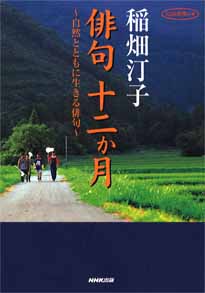NATURE AND OUR LIFE
--- Haiku Living Together with Nature ---
From the book entitled "Haiku in Twelve Months"
Authored by Ms. Inahata Teiko.
Translated by Mizuta Mutsumi
|
|
 September---All Things in Universe Becomes Clear in Autumn September---All Things in Universe Becomes Clear in Autumn
When September comes, the air becomes clearer and a sense of crisp autumn becomes deeper. When we think of a representative seasonal word of this time, there is nothing beyond tsuki (the moon). As shown by the phrase, setsu-getu-ka (the snow, the moon, the flower), the moon, which symbolizes the beauty of nature of this season, has appeared in a lot of poems and literary works from the old times. According to this tradition, tsuki (the moon) in haiku stands for the moon in autumn, and a number of the excellent haiku poems have been composed on the subject of the moon. Because the moon is the brightest in the year as the air of this season becomes the clearest. Autumn is the season in which we are lost in deep thought, as shown by a seasonal word, shushi (the deep grief of autumn). The moon has been the best subject in which we convey our feelings or deep emotions. Even after the space satellite Apollo reached the moon and sent the picture of the surface of the moon to the earth, the above-mentioned perception doesn't change, does it?
There are many seasonal words related to the moon in the glossary of seasonal terms for haiku composers; hatsuzuki(the new moon), futsukazukif (the second day-moon), mikazuki (the third-day moon), yuzukiyo (the moonlit evening ), tsuki (the moon), matsuyoi (the waiting evening), meigetsu (the harvest moon), tsukimi (the moon-viewing), ryoya (the clear full moon), mugetsu (no moon), ugetsu (the moon in the rain), izayoi (the 16th day-moon), tachimachizuki (the 17th day- moon), imachizuki (the 18th day-moon), fushimachizuki (the 19th day-moon), fukemachizuki (the 20th day-moon), nijusanya (the 23rd day-moon), yoiyami (dark at night). If we add the subtitles to each word related to the moon, the seasonal words would swell in number. And these seasonal words are included in September. For example, yoiyami means to be darkness at night about 20th day on the lunar calendar, as the moon doesn't rise till ten o'clock.
I hope you to study the correct meaning of each seasonal word and how to use it appropriately by consulting saijiki.
|
|